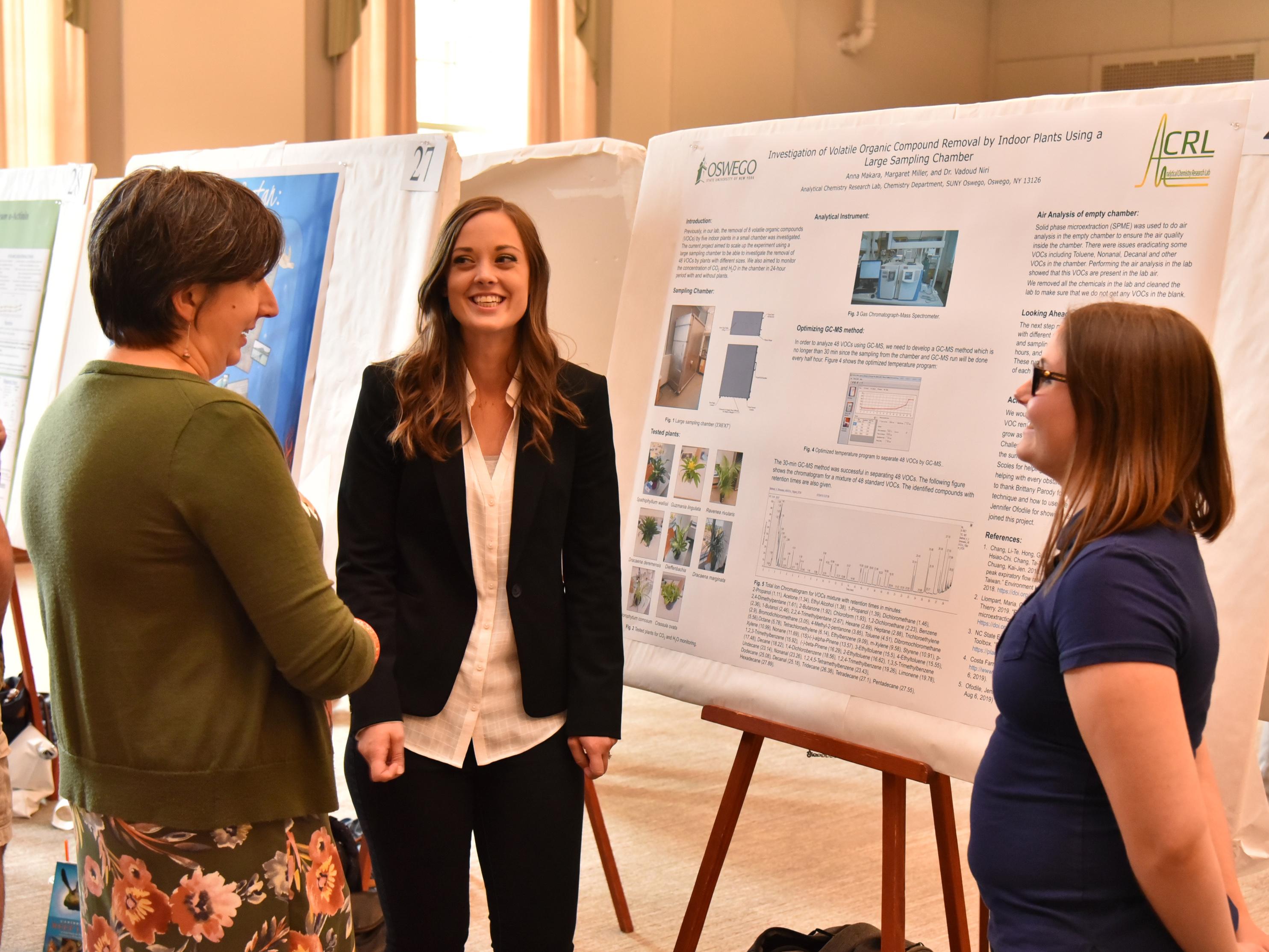Mentoring award -- Julia Koeppe of the chemistry faculty has earned this year’s Provost’s Award for Mentoring in Scholarly and Creative Activities. Here she speaks with students Maggie Miller and Anna Makara about their research in analytical chemistry during the September 2019 Research and Individualized Student Experiences Summer Scholar Symposium in Sheldon Hall ballroom.
Dedication to the success of student researchers has earned Julia Koeppe of the chemistry faculty this year’s Provost’s Award for Mentoring in Scholarly and Creative Activities.
In four years at Oswego, Koeppe has mentored 50 registered student researchers in biochemistry. “Students flock to her laboratory because the work she does is relevant and biochemistry methods she uses are modern,” said chemistry professor Kestas Bendiskas, who nominated her for the award.
MaryCatherine Rice, who earned her master’s and bachelor’s degrees through SUNY Oswego, then a scientific position in the pharmaceutical industry with Pfizer, credits Koeppe’s trust and lessons with instilling “the skills and tools I needed to excel both in my graduate program and in my professional career.”
“Dr. Koeppe is incredibly good at reading students and can see the potential in everyone,” Rice wrote, which means helping students achieve things in their research and leadership they might not have thought possible.
“She prepared me technically as well as provided the soft skills necessary to interact with fellow researchers, professors and eventual employers,” Rice said. “By challenging me and showing me what I was able to do as a researcher both academically and creatively, she completely changed my view of myself in this field.”
Rice described Koeppe as “a role model in science, and any student that is able to work with her in the future is extremely fortunate. She cares about the academic and future professional development of her students.”
'Above and beyond'
“Dr. Julia Koeppe goes above and beyond with her duties in mentoring students in their scholarly and creative work,” wrote Vanessa Wiltsie, a 2018 SUNY Oswego graduate who is now a Ph.D. student at the University of Alabama.
“Dr. Koeppe has numerous strengths, among them being how she is always available to her students, past and present, whether it be by email, phone call or office appointment,” Wiltsie said. “She genuinely cares about each one of her students and takes the time to get to know them on a personal level.”
For Wiltsie, these opportunities included an invitation to do research with Koeppe, which led to attending an antimicrobial resistance “boot camp” at Rutgers University, and a chance to present at the Biophysical Members Society Meeting in Baltimore -- where Wiltsie secured her current studies by presenting her research to the graduate recruiting committee with the University of Alabama.
“Dr. Koeppe not only gives her students the best mentoring regarding planning for our professional futures, she personally sets aside time to learn the personal goals of her students and plans out a way to achieve them,” Wiltsie wrote. “Dr. Koeppe has sent students to universities and medical schools across the United States.”
Another of those students is Ali Khan, a senior majoring in biochemistry and biology who plans to start in a Ph.D. program this fall at the University of Iowa’s Carver Medical School. “Dr. Koeppe has been a great mentor, teacher and an overall genuine human being,” wrote Khan, who added that Koeppe made it possible to present research at the annual Biophysical Conference earlier this year in San Diego.
“She taught me how to be resilient, troubleshoot problems and write effectively,” Khan said. “She goes above and beyond her role as an educator; most notably through her generosity and development of strong personal relationships with her students. It is not uncommon for students to stop by her office for a chat, a cup of tea or a baked good in addition to answering any of their questions.”
Passing along passion
“It is clear to me that Dr. Koeppe has such a genuine love and passion for the work that she does,” wrote senior biochemistry major Maggie Miller. “It makes it very easy, as a student, to want to be involved in such projects when the professor is excited about it too.”
Bendiskas noted that Koeppe -- who earned her Ph.D. from University of California, San Diego, and had a pair of postdoctorate placements at the University of Oxford -- has an active National Science Foundation grant and consistently secures additional internal grants to support student research contributing to the knowledge base of protein biochemistry. Her lab focuses on the study of protein interactions involved in the activation and regulation of the complement system. This complement system is an important part of innate immunity, where misregulation can lead to inflammatory diseases.
“Julia helps students succeed not only by engaging students but also by providing successful outcomes of their work,” Bendiskas wrote, noting she has submitted manuscripts with as many as three student co-authors, and has become “known as an excellent and beloved educator."
The Provost’s Award for Mentoring in Scholarly and Creative Activities is designed as recognition of a career highlighting significant accomplishments in mentoring students in scholarly or creative activity at SUNY Oswego.




